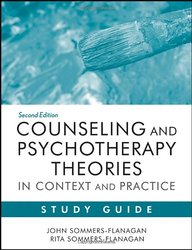I keep getting a steady stream of requests for the “long version” of our Theoretical Orientation Test. The TOT-Long is from our Study Guide, pictured here:

And here’s a link to the test:
When taking our TOT-Long, keep some or all of the following in the back (or front) of your mind.
- This questionnaire is for self-exploration; it’s not an “assessment” with established psychometrics. What that means–in the spirit of Adler–is that this so-called test is an idiographic assessment process.
- I’m not a big fan of counselors and psychotherapists pigeon-holing themselves into strict theoretical positions. Instead, finding a compatible theory can help you align with ways you can transform your ideas into practical ways of being and ways of working with clients. Don’t let your theoretical orientation stop you from flexibly providing clients with the services they need and want.
- All theory-based approaches work best from a relational foundation. If you question this basic assumption, try doing cold CBT with ambivalent or reluctant teenagers. . . or just imagining how that would go might be enough.
- I hope you enjoy contemplating where our theoretical “sorting hat” sends you. As with all assessments, you’re the final authority of whether the shoe (or hat) fits.
Please let me know what you think of the test and, if you’re so inclined, post your theoretical orientation as a comment here. I look forward to hearing and seeing your reactions and results.
Be well!
John SF

I am interested in the thinking and writing of Carl Jung ,although often it is very demanding reading and a bit obscure. One FB Group that I enjoy belonging to is “CG Jung and the Creative Bridge”. Because I have been in the relatively long term care of a counseling physician who espouses the principles of positive psychology , and because I have taken the character strength survey from VIA twice now, and because I chose to join this class at the last minute on Jan 11/21, I am increasingly understanding and feeling quite encouraged to use my contemplative, observational and choice making abilities to negotiate my tasks and my social connections. And I hope to become more attentive to the way my behaviour helps or does not help the person I am interacting with . I would like to be part of social connections that are more and more peaceful, playful and productive. I have been part of many dysfunctional relations, and I am beginning to see a way to make my connections more functional. I am not going to be a professional counselor, but I certainly have friends and family members whose relationships with me will be more
comfortable and enjoyable if I use some of the things I am learning about positivity in this course.